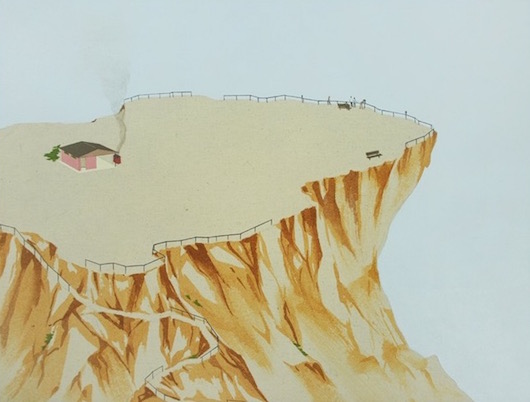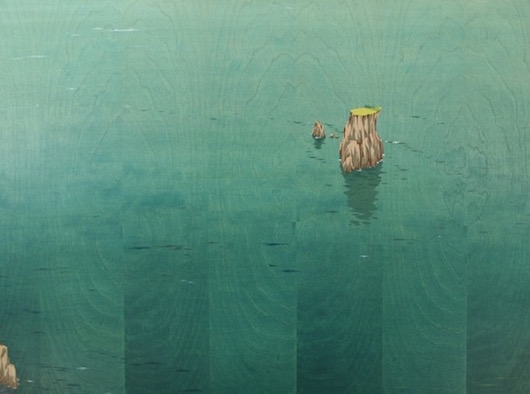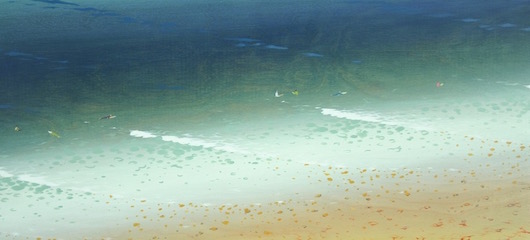 BOOKS
BOOKS In Which We Find Eric Gill Among Some Old Books
 Tuesday, September 19, 2017 at 8:00AM
Tuesday, September 19, 2017 at 8:00AM 
The Antidote
by MARK ARTURO
As years go by, Eric Gill becomes more, not less, unsettling.
- Fiona McCarthy
Art is not an aesthetic but a rhetorical activity.
- Ananda Coomaraswamy, epigraph to Eric Gill's essay "Art"
The natural world is God's present to himself.
- Eric Gill, Last Essays
Eric Gill would fuck anything: family members, strangers, a dog. It might seem strange, then, that he wrote essays praising Christianity, specifically Catholicism. I don't know that he even was admiring Christianity as much as he lived in wonderment in the pleasure of believing in something.
Eric Gill never had a regular job — he spent most of his time working on sculptures. They became more and more erotic, since he was obsessed with the carnal pleasures of the body. But even so, he had the temerity to write an essay entitled "Work." (Why is it the people who don't work always have so much to say about the meaning of it?) He wrote:
We must return again and again to the simple doctrine: physical labour, manual work, is not in itself bad. It is the necessary basis of all human production and, in the most strict sense of the words, physical labour directed to the production of things needed for human life is both honourable and holy. And we must remember that there no exceptions.
What is man? Is he just an animal for whom earthly life is all? Or is he a child of God with eternal life in view?
I honestly don't know which answer is worse.
Eric Gill kept a vial of poison in his workshop, just in case the mood struck him.

Quite naturally, Eric Gill made the act of creating art into a heavenly task. Perhaps he never imagined it would be democratized to a willing populace.
Eric Gill designed only one home in his long career. It was utterly normal-looking.
Eric Gill's nudes in particular are disturbing, given the various harms he perpetrated on his daughters. He found no boundaries in life, and since he was good at one thing, he felt it justified his pursuit of many others. You can find a similar quality in public figures. Moreover, they never apologize for their behavior, and take every opportunity to continue doing what they enjoy.

Eric Gill writes, We are ourselves creators. Through us exist things which God Himself could not otherwise have made. Our works are His works, but they are also in a strict sense our own, and if we present them to him, they are our presents to Him and not simply His to Himself. They are free-will offerings.
Do you understand why this is not a good philosophy?
Let me give you an example. I once knew a writer who was completely paranoid others would steal his precious ideas. He had this idea — I can share it with you now, because I think he is a priest or something like it, and gave up writing — about a murder mystery that involved a chase across the Andes. I don't know why he thought this was such an original concept, although it might have made for a nice story. When I tried to talk to him about it he put his fingers in his ears.
He also loved Eric Gill, and introduced Eric Gill to me. His name was Ben.

In a diary of his trip to Ireland, among other insulting things, Eric Gill writes, At Ballinasloe saw the first people either distinctly Irish or distinctly beautiful — two girls. Otherwise, all the people ugly as in England.
Do you understand why this is not a good philosophy?
The world of men lasted for quite a long time. It was a natural extension of a philosophy that there was a reason why some things were beautiful, and a reason why things were ugly. Because if you think at any length about this, it is more a trick of the mind than an actual perspective on events. Therefore, objectifying women was morally correct for such people, and Eric Gill.

By 1930, Eric Gill began to suffer from intermittent amnesia. Even in this forgetful state, he knew he had done awful things to people he should have cared for, even beyond how much he cared for and loved himself. Life had completely proved his view of things wrong, and the creeping sensation of this infected what remained of his existence, as well as his writing.
He wrote:
I believe in birth control by the man by means of:
(1) Karetza.
(2) Abstinence from intercourse.
(3) Withdrawal before ejaculation.
(4) French letters.
I don’t think 3 and 4 are good. I don’t think abstinence from orgasm is necessarily a bad thing. It depends on the state of mind and states of mind can be cultivated. (Anyway there’s no point in ejaculating seed into a woman who doesn’t welcome it – they can jolly well go without, if they don’t want our spunk they needn’t have it.) Let us talk about Matriarchy next time.
In 1934, Eric Gill went to Jerusalem for the first time. He saw all the usual tourist sites, with the wonder of a child. He began wearing a long, black robe and a head cloth, in a demented parody of Jesus, a man he admired. He was so happy, and then God bestowed upon Eric Gill a painful toothache. I guess sometimes God gives himself a gift.
Mark Arturo is the senior contributor to This Recording. He is a writer living in Manhattan.

 eric gill,
eric gill,  mark arturo
mark arturo 






































